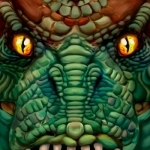
3rd Grade Math: Fractions, Geometry, Common Core
Education and Games
App
LogTera Grade 3 Math app provides the most fun game for children 5 to 9 years, while comprehensively...

Kids preschool & kindergarten learning games free
Games and Education
App
** Fun EDUCATIONAL game for toddlers of AGE 3.5 and up ** Developed with certified child...

Fashion Nails 3D Girls Game: Create Awesome Manicure Designs in Your Beauty Salon
Lifestyle and Games
App
*** Become an expert in creating fashion manicure designs in our fun girl games! *** ** Fashion...
Purple Phoenix Games (2266 KP) rated Party Bandimals in Tabletop Games
Oct 8, 2019
Party Bandimals is a card game where players are band managers looking to fill out their respective musical groups that feature anthropomorphic animals playing musical instruments. Each turn players are trying to boost their own bands with wicked rad band members while simultaneously subbing in the uncool members to their opponents’ bands.
DISCLAIMER: We were provided a prototype copy of this game for the purposes of this review. As this is a preview copy of the game, I do not know if the final rules or components will be similar or different to what we were provided. -T
A game of Party Bandimals takes place over a series of rounds. The first player to amass a band whose total strength equals or exceeds 11 (net). Each animal card has a number printed in the upper left hand corner indicating its strength, be it positive or negative. Positive numbered cards are played to your band tableau and negative cards to an opponent’s band – thus lowering their total strength score.
To setup shuffle the cards and deal three to each player. Any player that has received any cards with the “Play when drawn” icon must discard those and draw up to three. You are now ready to play.
On your turn you draw up to four cards and then play a card from your hand. Any card drawn with the “Play when drawn” icon (see “Bob” above) will be played immediately. Otherwise, you may choose any card in your hand to be played. These could be band members or other events. Some cards are designed to be played as reaction cards to other opponents’ plays and can be played out of turn. That’s it! The rules and game play are very light, and games are very quick.
Components: This is a card game. Mine came in a tin, though I do not know if that is the plan for when the game goes retail or as result of a successful Kickstarter campaign. The cards are good quality, and the art on them is very cool. The names are sometimes hilarious and the art reflects that as well. Each character has a personality, and some are even inspired by the designer’s friends and family. I didn’t see any trumpet playing Travis cards, so maybe that’s in the works…
So here are my thoughts on Party Bandimals. It’s a really quick game with some interesting decisions and LOTS of take that. I mean, you’re trying to put a band together of the sickest entertainers out there, but so are your opponents. You are pawning off the bad musicians on your friends opponents and keeping all the good musicians. It really works well when you want a super quick filler with a great theme, fun art (I mean, look at lil Elanor up there on that harmonica solo), and grudges to be formed. If your group likes take that games, or at least don’t get all bent out of shape, then you should check out Party Bandimals. It’s quick, fun, and has a great theme. What more do you want, people???

Kappboom - Cool Wallpapers & Background Wallpapers
Photo & Video and Social Networking
App
The #1 Ranked and Best Wallpapers app with over 200,000 beautiful and cool wallpapers at your...

Nail Art Beauty Salon Game: Cute Designs and Manicure Ideas for Girls
Lifestyle and Games
App
***Ultra exciting 3D nail art game for a trendy fashionista like you!*** ***Unleash your creativity...

Ultimate Dinosaur Simulator
Games and Entertainment
App
Discover a long lost prehistoric world and rule over it as an all mighty Dinosaur! Travel back to a...

Awesome Shape Puzzles 123
Games and Education
App
- Let learning become your children's favourite pastime with this fun shape puzzle game that doubles...

Toca Life: Farm
Education and Entertainment
App
Work and play the farmer's way! Milk your cow, gather eggs from your hens and raise your crops. Have...

Joy of Cooking
Food & Drink and Book
App
Joy of Cooking, the first cookbook in many kitchens, is now the must-have app for every...
